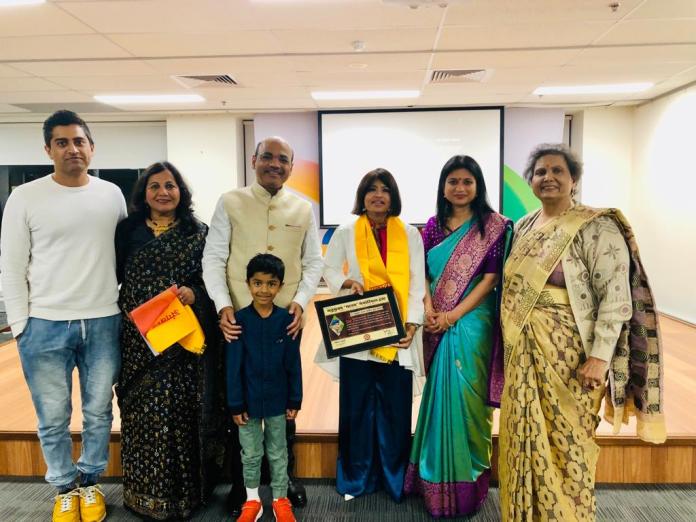Consul General of India in Sydney, Swami Vivekananda Cultural Centre (SVCC, Sydney) and ILASA (Indian Literary & Arts Society of Australia) organised a programme on Hindi Diwas (Hindi Day) which is celebrated on 14th September in India and around the world.
Celebrating the day in a novel way, the programme included honouring five giants of Hindi literature and a poetry contest for those attending.

Five Hindi writers and poets in Sydney (Anil Verma, Dr Shailja Chaturvedi, Mrinal Sharma, Siddhant Nakra and Abhishek Tongia) took the attendees down memory lane when they spoke about the five giants of Hindi literature – Munshi Premchand, Mahadevi Verma, Ramdhari Singh ‘Dinkar’, Former PM of India Atal Bihari Vajpayee and Mannu Bhandari.
Anil Verma spoke about Premchand, who is in the pantheons of global literary giants. Born as Dhanpat Rai on 31st July 1880 in Lamhi of India’s Varanasi district he wrote extensively in Hindi and Urdu under his pseudonyms ‘Premchand’ and ‘Nawab Rai’. He dedicated his literary career towards promoting anti-imperialism and egalitarianism among the masses.

Mahadevi Verma is another name that is unmissable while speaking about revolutionaries in the world of literature. Dr Shailja Chaturdervedi spoke about the legendary writer and poet who was the torch bearer for many who came after her. Born on 26 March 1907 in Farukkhabad, Uttar Pradesh, she was a strong proponent of women’s rights and feminism and the first woman to receive a fellowship with Sahitya Akademi (Literature Academy). Mahadevi Verma was among the first Indian female poets to raise the subject of women empowerment.

Mrinal Sharma delved into the poetry of ‘Dinkar’ whose poems are eternally moving. Born on 23 September 1908 in Begusarai district of Bihar, he used the power of his words and emotions effectively during India’s fight for freedom. Dinkar was hailed as the greatest Hindi poet of ‘Veer Rasa‘ (poems that relate to the genre of heroism and courage), which earned him the title ‘Rashtra Kavi‘ (National Poet).

Siddhant Nakra spoke about India’s former Prime Minister Atal Bihari Vajpayee who was also a critically acclaimed poet and renowned for his oratory skills. He was born on 25 December 1924, in the erstwhile princely state of Gwalior (now a part of Madhya Pradesh). He stood for an India anchored in thousands of years of civilisational history, ever modernising, ever renewing, ever re-energising itself to meet the challenges of the next 1000 years.

Abhishek Tongia reflected on the works of Mannu Bhnadari, an eminent Hindi novelist and feminist. Born in 1931 in Bhanpura, Madhya Pradesh some of her works were captured in camera with films like ‘Rajnigandha’ and ‘Swami’ and the TV series ‘Rajni’. A pioneer of the ‘Nayi Kahani’ (New story) movement, she wrote several novels, over 150 short stories, screenplays for films and TV and adaptations for theatre.

The programme also included felicitating the winners of the ‘Dr Manu Mukt Manav international youth awards’ that are named after an IPS (Indian Police Service) officer in India, who died very young. His father started these awards 9 years ago to recognise young talents. This year the recipients of this award were well known entrepreneur Sonia Sadiq Gandhi and dentist Dr Mohit Tolani.


To engage the attendees the programme also had an impromptu Hindi poetry competition on a topic given then and there which was ‘sagar’ (ocean). Founder of ILASA, Rekha Rajvanshi, held a short and delightful workshop to guide the attendees on how to write poetry. Dr Suman Aggarwal won the first prize followed by Riju Bhargava and Samay Jain who came second and third. However, all the attendees were winners given their zest to keep the literary tradition of Hindi alive.

The programme was hosted by Rekha Rajvanshi founder of ILASA and Niyati Mehta (Director SVCC, Sydney).




Support Our Journalism
Global Indian Diaspora needs fair, non-hyphenated, and questioning journalism, packed with on-ground reporting. The Australia Today – with exceptional reporters, columnists, and editors – is doing just that. Sustaining this needs support from wonderful readers like you.
Whether you live in Australia, the United Kingdom, Canada, the United States of America, or India you can take a paid subscription by clicking Patreon. Buy an annual ‘The Australia Today Membership’ to support independent journalism and get special benefits.




